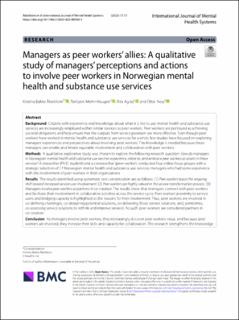| dc.contributor.author | Åkerblom, Kristina Bakke | |
| dc.contributor.author | Mohn-Haugen, Torbjørn | |
| dc.contributor.author | Agdal, Rita | |
| dc.contributor.author | Ness, Ottar | |
| dc.date.accessioned | 2023-11-10T12:16:48Z | |
| dc.date.available | 2023-11-10T12:16:48Z | |
| dc.date.created | 2023-06-03T16:34:33Z | |
| dc.date.issued | 2023 | |
| dc.identifier.citation | International Journal of Mental Health Systems. 2023, 17 (1), . | en_US |
| dc.identifier.issn | 1752-4458 | |
| dc.identifier.uri | https://hdl.handle.net/11250/3101889 | |
| dc.description.abstract | Background Citizens with experience and knowledge about what it is like to use mental health and substance use services are increasingly employed within similar services as peer workers. Peer workers are portrayed as achieving societal obligations and help ensure that the outputs from service provision are more effective. Even though peer workers have worked in mental health and substance use services for a while, few studies have focused on exploring managers’ experiences and perspectives about involving peer workers. This knowledge is needed because these managers can enable and hinder equitable involvement and collaboration with peer workers. Methods A qualitative explorative study was chosen to explore the following research question: How do managers in Norwegian mental health and substance use services experience, relate to, and embrace peer workers as assets in these services? A researcher (Ph.D. student) and a coresearcher (peer worker) conducted four online focus groups with a strategic selection of 17 Norwegian mental health and substance use services managers who had some experience with the involvement of peer workers in their organizations. Results The results identified using systematic text condensation are as follows: [1] Peer workers boost the ongoing shift toward increased service user involvement. [2] Peer workers are highly valued in the service transformation process. [3] Managers involve peer workers as partners in co-creation. The results show that managers connect with peer workers and facilitate their involvement in collaborative activities across the service cycle. Peer workers’ proximity to service users and bridging capacity is highlighted as the reasons for their involvement. Thus, peer workers are involved in co-defining challenges, co-designing potential solutions, co-delivering those service solutions, and, sometimes, co-assessing service solutions to rethink and improve services. As such, peer workers are considered partners in co-creation. Conclusion As managers involve peer workers, they increasingly discover peer workers’ value, and because peer workers are involved, they increase their skills and capacity for collaboration. This research strengthens the knowledge base of the perceived value of peer workers’ roles, bringing in new perspectives from management about utilizing and evaluating peer worker roles. | en_US |
| dc.language.iso | eng | en_US |
| dc.publisher | BioMed Central | en_US |
| dc.rights | Navngivelse 4.0 Internasjonal | * |
| dc.rights.uri | http://creativecommons.org/licenses/by/4.0/deed.no | * |
| dc.title | Managers as peer workers’ allies: A qualitative study of managers’ perceptions and actions to involve peer workers in Norwegian mental health and substance use services | en_US |
| dc.type | Peer reviewed | en_US |
| dc.type | Journal article | en_US |
| dc.description.version | publishedVersion | en_US |
| dc.rights.holder | © The Author(s) 2023 | en_US |
| dc.source.pagenumber | 13 | en_US |
| dc.source.volume | 17 | en_US |
| dc.source.journal | International Journal of Mental Health Systems | en_US |
| dc.source.issue | 1 | en_US |
| dc.identifier.doi | 10.1186/s13033-023-00588-5 | |
| dc.identifier.cristin | 2151519 | |
| dc.source.articlenumber | 17 | en_US |
| cristin.ispublished | true | |
| cristin.fulltext | original | |
| cristin.qualitycode | 1 | |

